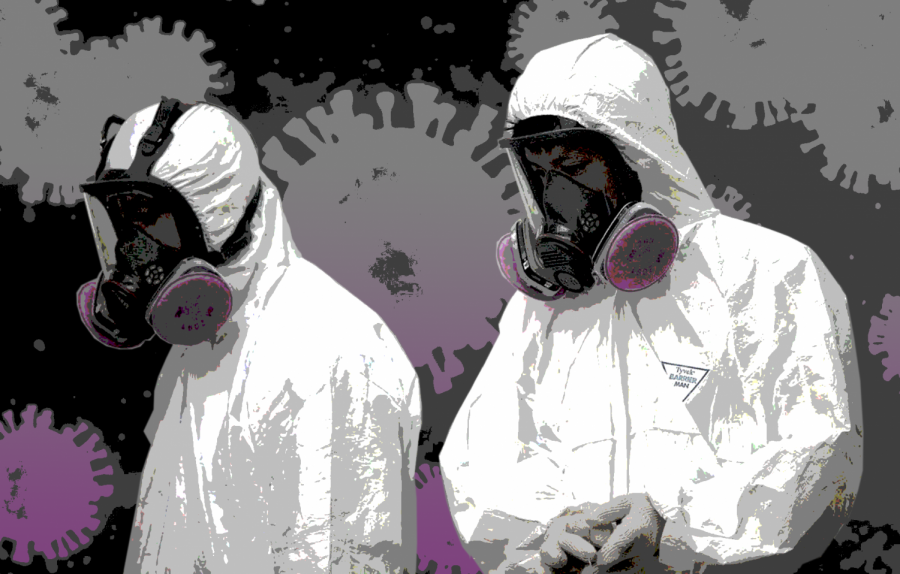Buening: We Need to Carry Public Health Lessons Into the Future
(Graphic by Cyan Larson | The Daily Utah Chronicle)
August 31, 2021
Less than a year and a half ago, none of us could have imagined the mark COVID-19 would leave on our world. Now, we are only beginning to emerge from one of the most confusing and unique chapters of our student experience. The pandemic opened our eyes to the realities of public health crises and we cannot afford to shut them again. As students and future leaders, it is our responsibility to carry the lessons we’ve learned and improve upon the shortcomings in education and culture this pandemic has made so apparent.
One positive thing to come from the pandemic was a rise in scientific literacy. Information about vaccinations, quarantining and other epidemiological practices became much more commonplace. Personal hygiene also improved as Americans began washing their hands more often and for longer. These improvements shouldn’t fade as we approach normalcy once again. We need to remain vigilant to curb another health disaster, and encouraging education is a critical part of succeeding in that mission.
The importance of scientific literacy shouldn’t be realized in the wake of disaster. If the public had possessed more knowledge about these subjects before COVID-19, we might have seen a greater willingness to listen to experts, better follow guidelines and recognize misinformation. Unfortunately, misinformation and conspiracy theories are almost as contagious as the virus. As a country, we seemed particularly susceptible to the spread of these absurdities. Vaccine hesitation has plagued the country in the past and this year 22% of Americans are against vaccination.
This anti-vax movement has been fueled by a plethora of outrageous myths. People subscribe to misleading stories about microchipped vaccines, the virus escaping from a Chinese lab and fears of reproductive or genetic manipulation. This conspiracy culture has to stop. Pandemics aren’t a thing of the past, nor are other public health issues. Vaccine refusal, coupled with COVID-19 denial, has led to real deaths and other consequences that are irreversible.
I had the privilege of speaking with Dr. Steve Alder from the University of Utah’s public health and medicine departments. He said that one of the most important roles we play as university-educated individuals is taking down conspiracy rhetoric by utilizing critical thinking skills. “Having the ability to be a good consumer of information, particularly scientific data, is important,” he said. “Be somebody who can think about and utilize data effectively, whether it’s in [your] professions or whether it’s in the service [you] may do [in your] community, or for [your] own benefit.”
Better public health requires that we stop conspiracy culture from seeping into our future. More than that, it requires wariness and basic decency. For students in the pandemic, this meant making the sacrifice of public gatherings and missing out on in-person learning experiences. Understandably, this was disappointing. Although anger and sadness were valid reactions to these precautions, they still didn’t validate decisions to put communities at harm.
As college students, we are among the population of young adults that in some ways felt less vulnerable to COVID-19. It’s important that moving forward, we remain cognizant of the role we play in public health matters. College-age students greatly hindered the effectiveness of preventative measures in Utah, as many ignored CDC guidelines and contributed to the spread of the virus. Even as vaccinations began rolling out, we maintained some of the lowest vaccination rates among any demographic. Currently, the younger population is one of the biggest barriers to achieving mass immunity.
Attitudes of invulnerability, individualism and contention from students pushed COVID-19’s negative impacts onto other communities, as well as our own — and cultural and political failures contributed to this attitude. Extreme individualism prevents us from acknowledging the roles we play in a bigger system, perpetuating pandemic spread. Ninety-three percent of American COVID-19 deaths were among those ages 55 or older. The older population suffered because of the prevalence of false invulnerability on our part.
As I go into this school year, I want to take Dr. Alder’s cautions to heart. Particularly when he encouraged students to be “communally minded” and ultimately “act on each other’s behalf to try and better humanity through this process.” I’m grateful for the progress that has been made to allow us to continue in-person education, but COVID-19 is not in the past. We are still dealing with the delta variant’s emergence and ongoing worldwide moralities. This isn’t the only public health crisis we will witness in our lives, so we must remain conscientious. Just as the effects of this pandemic will follow us into the future, so must its public health lessons. At least that way we can procure some good from an otherwise devastating experience.









